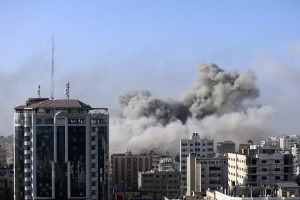Following a terrorist attack by Hamas on October 7, Israel declared war on the group and began a brutal ground operation in Gaza that has left more than 7,500 dead – including many children – in three weeks. How have Central Asian governments reacted to the Israel-Palestine conflict?
Four of the five Central Asian states quickly issued statements expressing alarm at the severity of the conflict. (Turkmenistan, predictably, has remained silent.)
Tajikistan’s statement, issued on October 8, makes no specific reference to Israel, Palestine, or Hamas. Instead, the Tajik Ministry of Foreign Affairs expressed “great concern” over civilian casualties and the destruction of housing and social infrastructure. Kazakhstan’s Foreign Minister also made a statement on October 8 calling for “both sides” to resolve the situation peacefully.
Kyrgyzstan and Uzbekistan made statements on October 9, both of which make direct reference to the actors involved in the conflict.*
On October 16, Israel’s Ministry of Foreign Affairs announced that three citizens of Uzbekistan were killed in the initial Hamas attack. Later investigation found that they had left Uzbekistan in the 1990s and did not have valid Uzbek passports, however.
An attack on Gaza on October 22 left a Kazakh citizen and her young daughter – a citizen of Palestine – dead, less than a week after Kazakhstan’s consulates in Egypt and Jordan coordinated to get 67 Kazakh citizens and 30 of their family members out of the Gaza Strip.
On October 13, leaders from the Commonwealth of Independent States (CIS) met in Bishkek for the annual heads of state summit. Kazakh President Kassym-Jomart Tokayev used his platform to discuss the conflict unfolding in Gaza. “You cannot resort to violence against civilians or resort to terrorist acts to achieve tasks that have not been resolved for decades. This cannot be justified in any way,” Tokayev said. Terrorism is a frequent talking point for Central Asian leaders, who have frequently justified repression of political opposition and dissent as necessarily counter-extremism efforts.
Another round of official statements came out of the region’s Ministries of Foreign Affairs following an explosion at the al-Ahli Arab Hospital in Gaza, where Palestinian officials said almost 500 people were killed. On October 18, Kyrgyzstan, Tajikistan, and Uzbekistan issued statements about the blast. Uzbekistan’s Ministry of Foreign Affairs called this “sinister act of violence” a “flagrant violation of international humanitarian law.”
On October 23, Kyrgyzstan’s parliament approved a measure that would donate one month’s salary – about $300 per MP – to humanitarian aid in Gaza. Only 76 of 90 MPs voted, and of that, 47 voted in favor. “When our neighbors attacked us, it was hard for us. Help from abroad was warmly welcomed. We can provide such assistance,” said Janybek Kydykbayev, who is a member of the Ata-Jurt Kyrgyzstan party.
Uzbekistan stepped up in a leadership role on October 27, when Foreign Minister Baxtiyor Saidov posted about hosting representatives of diplomatic missions from Algeria, Egypt, Jordan, Kuwait, Palestine, Qatar, Saudi Arabia, the UAE, and Israel to discuss the situation in Gaza. There was no press coverage of the event, however, and the only details about who met are contained in Saidov’s social media posts.
Kazakhstan, Kyrgyzstan, Tajikistan, and Uzbekistan all voted in favor of a U.N. resolution calling for a humanitarian truce between Israel and Hamas, which passed on October 27 with 120 total votes. Turkmenistan did not vote, as usual.
Analysts may attempt to look at the voting pattern as a prophetic looking glass, comparing the four “yes” votes with recent reticence to vote at all on U.N. resolutions regarding Russia’s large-scale invasion of Ukraine and China’s treatment of Uyghurs.
While political leaders from both Russia and Ukraine have attempted to map their crisis onto this renewed violence in Palestine, Central Asian states’ votes to open a humanitarian corridor don’t necessarily speak to their opinions about Russia’s aggression in Ukraine.
Russia holds significantly more influence over Central Asian governments than Israel, though this is not to say that Israel is not a relevant player in the region’s multivector diplomacy. In April 2023, Israel’s Foreign Minister Eli Cohen visited Turkmenistan to meet President Serdar Berdimuhamedov and to open a permanent embassy. Uzbekistan has collaborated with Israel on trade, tourism, and training nursing staff. Kazakhstan supplies somewhere between 10 and 25 percent of Israel’s oil, and Astana buys Israeli drones and rockets for its armed forces.
Another possible explanation is that the Central Asian states voted the way they did because of religious motivations.
Islam is a deeply salient identity across Central Asia, and the region’s leaders have struck a balance between apprehension toward religion and efforts to co-opt religion for political ends. But while four Central Asian countries voted for a humanitarian truce, the language of their press statements do not suggest their policy is motivated by religious affinity.
The usual analytical toolkit for predicting diplomatic outcomes in Central Asia, such as military ties, concerns about terrorism, market incentives, and religio-cultural affinities, falls flat in the layered complexity of the Israel-Palestine conflict. Until it comes time for Central Asian governments to contribute humanitarian or military aid, the only signals out there – press statements published on Telegram channels and U.N. votes – remain noisy.
*Correction: An earlier version of this article stated that Kyrgyzstan’s statement had been removed from the Ministry of Foreign Affairs website. Although at the time of publishing it was not accessible, it now is available and linked above.
































